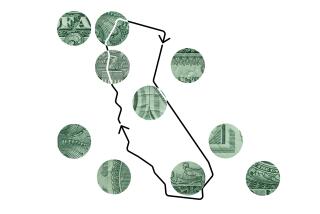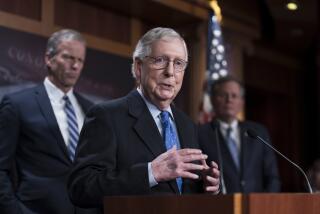Opened Lincoln S&L; Line of Credit, Cranston Admits
- Share via
Sen. Alan Cranston (D-Calif.), currently under investigation for his dealings with financier Charles H. Keating Jr., acknowledged Thursday that he opened a $300,000 line of credit from Keating’s Lincoln Savings & Loan shortly before his reelection in November, 1986.
Murray Flander, spokesman for Cranston, said the line of credit was arranged by Cranston because he felt he was being outspent by his opponent, Republican Ed Zhau. But Flander added that Cranston never needed to use the credit.
Although Keating played no role in arranging the deal, Flander said Cranston went to Lincoln for the line of credit because he knew the thrift owner, who had raised $39,000 for the Cranston campaign. He said Cranston “felt he could get quick action through Lincoln because of the Keating connection.”
In addition to the 1986 campaign contributions and the line of credit, Keating also contributed $85,000 solicited by Cranston for the California Democratic Party and later gave more than $800,000 to voter registration drives supported by Cranston.
The Senate Ethics Committee and the Justice Department currently are investigating allegations that Cranston and four other senators, all of whom received donations from Keating, intervened improperly on Lincoln’s behalf with federal regulators who were investigating the Irvine thrift.
Critics have charged that the influence of Cranston and the other senators helped to dissuade federal regulators from seizing Lincoln in 1987. When it was finally seized by the government for mismanagement in April, 1989, it became the biggest thrift failure in U.S. history, costing American taxpayers an estimated $2.5 billion.
Although Flander dismissed it as a “non-story,” the line of credit--first disclosed by the San Francisco Chronicle--demonstrates another close tie between Cranston and Keating, who has admitted that he tried to buy influence with politicians in Washington to assist him in his battle against federal savings and loan regulators.
Cranston was one of five senators who summoned Edwin J. Gray, then chairman of the Federal Home Loan Bank Board, to the Capitol to discuss Keating’s complaints against the regulators. Although the senators deny it, Gray insists they asked him to withdraw a regulator opposed by Keating.
Cranston has strongly denied any wrongdoing in the matter. He contends that he was involved in representing Lincoln in dealings with federal regulators because the thrift employs hundreds of people in Southern California.
The senator also has denied that the campaign contributions and other money he solicited from Keating in any way influenced his decision to contact federal regulators on Lincoln’s behalf. He cites a Supreme Court decision saying that members of Congress are expected to cajole federal officials on behalf of constituents.
According to Flander, Cranston pledged some of his vast real estate holdings to Lincoln as collateral for the $300,000 line of credit he negotiated with Lincoln. “It was a strictly secured business deal,” he emphasized.
In Phoenix, Bradley Boland, spokesman for Keating’s company, American Continental Corp., acknowledged that the line of credit was agreed upon in principle in October, 1986, and could have been executed by Cranston at any time.
Under investigation along with Cranston are Sens. Donald W. Riegle Jr. (D-Mich.), Dennis DeConcini (D-Ariz.), John McCain (R-Ariz.) and John Glenn (D-Ohio). It is not known when the Senate Ethics Committee or the Justice Department inquiries will be completed.
More to Read
Get the L.A. Times Politics newsletter
Deeply reported insights into legislation, politics and policy from Sacramento, Washington and beyond. In your inbox twice per week.
You may occasionally receive promotional content from the Los Angeles Times.










